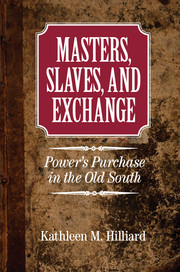Conclusion
Published online by Cambridge University Press: 05 June 2014
Summary
But, tell me, Faustus, shall I have thy soul?
And I will be thy slave, and wait on thee,
And give thee more than thou has wit to ask.
Across three generations and more, countless masters and slaves posed the question Mephistopheles asked and made their choice. Faustus’s reward of riches and power was blighted by the knowledge that earthly abundance was fleeting; twenty-four years on he would be dragged down to hell and torn limb from limb. Whatever gratification they found in the temporary comforts of material exchange, masters knew and slaves surmised, there could be no lasting solace: the same fate, in one form or another, must befall all who worship Mammon.
Tens of thousands of individual transactions dot the documentary record of the Old South. In these scratched ciphers, practical prescriptions, and righteous recollections, we see snapshots, not just of local economic exchange or the banality of slave life, but of inexorable political struggle. Indeed, in most of the transactions this book has described, we see only the point of collision, that moment when goods, cash, or promises passed from hand to hand. The goal of this book has been both to understand the way forces accumulated, focused, and arrived at the point of contest and to trace the repercussions that echoed outward, reaching far out from the moment of talk and trade in which they began.
- Type
- Chapter
- Information
- Masters, Slaves, and ExchangePower's Purchase in the Old South, pp. 182 - 186Publisher: Cambridge University PressPrint publication year: 2013

